Classic Commentaries and Studies on Hebrews Upgrade (15 vols.)
Digital Logos Edition
This product has been transferred from Community Pricing to Pre-Pub. The actual funding level may be lower than it appears, which could delay production. The amount of funding still needed will be evaluated and updated soon.
Overview
The Classic Commentaries and Studies on Hebrews Upgrade presents a diversity of resources that address issues related to the authorship and provenance of Hebrews, the technical details of the text, doctrinal theology, and the internal theology of the epistle. George Steward’s The Argument of the Epistle to the Hebrews adds a refreshing abstract treatment of the philosophical presuppositions of Hebrews and how they impact the book’s theological articulation. Several volumes that focus on Hebrews’ impact on the Christian complete the collection and provide it with a welcome balance.
With the Logos editions, these valuable volumes are enhanced by amazing functionality and features. Scripture and ancient-text citations link directly to English translations and original-language texts, and important terms link to dictionaries, encyclopedias, and a wealth of other resources in your digital library. Perform powerful searches with the Topic Guide to instantly gather relevant biblical texts and resources. Tablet and mobile apps let you take the discussion with you. With Logos Bible Software, the most efficient and comprehensive research tools are in one place so you get the most out of your study.
Looking for more classic commentaries on Hebrews? Check out our original Classic Commentaries on Hebrews collection!
Key Features
- Features critical exegesis and theological synthesis
- Presents an extensive list of titles that address Hebrews’ use of the Old Testament
- Proposes multiple theories regarding authorship and provenance
- Focuses on the Greek text, yet is accessible to non-specialists
Product Details
- Title: Classic Commentaries and Studies on Hebrews Upgrade
- Volumes: 15
- Pages: 5,464
Individual Titles
- Commentary on the Epistle to the Hebrews by A. C. Kendrick
- Twenty-Seven Lectures, or Readings, upon Part of the Epistle Written to the Hebrews by Edward Deering
- A Commentary on the Epistle to the Hebrews, vol. 1 by August Tholuck
- A Commentary on the Epistle to the Hebrews, vol. 2 by August Tholuck
- Short Explanation of the Epistle of Paul to the Hebrews by David Dickson
- A Commentary, Expository and Practical, on the Epistle to the Hebrews by Alexander S. Patterson
- The Argument of the Epistle to the Hebrews by George Steward
- Lectures on the Epistle to the Hebrews, vol. 1 by William Lindsay
- Lectures on the Epistle to the Hebrews, vol. 2 by William Lindsay
- The Christology of the Epistle to the Hebrews Including its Relation to the Developing Christology of the Primitive Church by Harris Lachlan MacNeill
- The Epistle of Priesthood: Studies in the Epistle to the Hebrews by Alexander Nairne
- The Apostolic Liturgy and the Epistle to the Hebrews: Being a Commentary on the Epistle in its Relation to the Holy Eucharist, with Appendices on the Liturgy of the Primitive Church by John Edward Field
- La Théologie de L’épitre aux Hébreux by Eugène Ménégoz
- L’épître aux Hébreux: Essai D’une Traduction Nouvelle D'une Commentaire Théologique by Édouard Reuss
- Der Brief an die Hebräer by Johann Heinrich Kurtz
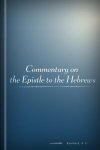
A. C. Kendrick’s Commentary on the Epistle to the Hebrews is a classic exegetical commentary that focuses on the biblical text while integrating relevant historical and sociological data. Kendrick works from the Greek, but his comments focus on his English translation and Greek is not required for readers to profit greatly from Kendrick’s analysis. The epistle’s difficult introductory matters, including authorship, provenance, and date, receive due attention, and Kendrick provides an intriguing argument for Apollos as Hebrews’ author.
A. C. Kendrick (1809–1895) was a famous New Testament scholar and professor of Greek at the University of Rochester. To commemorate his career, his peers published An American Scholar: A Tribute to Asahel Clark Kendrick, in his honor.
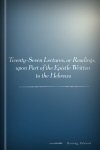
Published in 1590, and written just as English began transitioning into its modern form, Deering’s Twenty-Seven Lectures examine the most difficult and controversial texts in the book of Hebrews. Deering draws on a pre-authorized English version of the epistle and conducts an exegetical examination of each text, with a view to resolving the most challenging problems associated with it from a traditional Protestant perspective. Introductory matters, such as the difficult question of Hebrews’ authorship and intended destination, receive due attention. Though nearly 500 years old, Deering’s work is readable and accessible: modern readers will find much to consider in this commentary.
Edward Deering was educated at Christ’s College, Cambridge. He held multiple distinguished royal preaching offices, and was considered one of the most respected scholars of the Early Modern period in England.
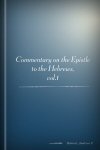
The authorship and provenance of Hebrews are two of the most difficult questions in biblical scholarship. A commentator’s later exegetical conclusions directly connect to their judgments about the book’s authorship and origin. In this commentary, August Tholuck engages these questions extensively, examining both the external or circumstantial evidence and the internal linguistic evidence. Throughout the commentary, Tholuck shows why the question of authorship and provenance directly relates to the message of the epistle. He examines the Greek text of Hebrews and bases his conclusions on it. With some rare exceptions, an English translation of the biblical text is not provided, and readers should be prepared for thorough discussion of the book’s technical issues—though Tholuck consistently reminds the reader of Hebrews’ devotional quality.
August Tholuck was educated at the University of Breslau and the University of Berlin. He served as a professor of theology at Berlin and at Halle. He became the leading advocate of pietistic evangelical Christianity in Germany, and refuted the growing trend toward philosophical rationalism. He authored many books, including commentaries on Romans, John, and the Sermon on the Mount.
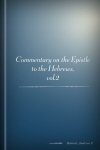
Volume two of Tholuck’s Commentary on Hebrews continues the technical examination of the text he began in volume one. He continues to leverage his technical analyses of the historical and linguistic data to augment his arguments regarding authorship and provenance. Tholuck works from the Greek text, and English translations appear occasionally.
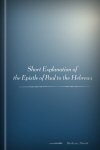
David Dickson’s Short Explanation of the Epistle of Paul to the Hebrews provides succinct interpretations of the book of Hebrews, phrase by phrase. At the beginning of each chapter, Dickson provides a brief snapshot of its contents that identifies its context and its theological contribution. The biblical passage in abbreviated form follows, and then salient doctrinal teachings located in the chapter. Intended for devotional reading, this volume provides text-based succinct biblical teaching.
David Dickson (1583–1662), known as “The Apostle of the Covenant”, was a distinguished minister and author. He was the author of several books, including Truth’s Victory over Error, as well as commentaries on the Psalms, Matthew, and Hebrews. He also contributed to the Directory for Public Worship for the Westminster Assembly, and co-authored The Sum of Saving Knowledge with James Durham.
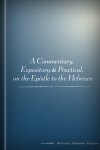
Acknowledging the importance of authorship, Patterson’s A Commentary, Expository and Practical, on the Epistle to the Hebrews aims to demonstrate the doctrinal importance of the epistle despite its doubtful origins. To this end, Patterson unpacks the text exegetically for the purpose of edifying the church rather than solving perennial technical issues. He focuses on the meaning of the text for practical purposes, while also stressing Hebrews’ critical Christological contributions.
Alexander S. Patterson (1805–1885) was educated at the University of Glasgow and served for most of his life as a Presbyterian minister.
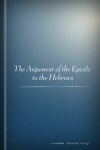
The Argument of the Epistle to the Hebrews is a unique commentary closely akin to the modern “theological” commentary. Steward focuses on the philosophical concepts that Hebrews’ author assumes, such as revelation or the a priori of divine existence, while explaining how the author of Hebrews defines, uses, and applies these concepts in understanding the biblical text. Steward’s concern is almost exclusively set on matters of systematic and philosophical theology. This is not a traditional, text-based commentary but one that explores the abstract ideas that Hebrews’ author puts forth, while seeking to understand their relevance for modern Christianity.
George Steward was a distinguished New Testament scholar, and author of the landmark book Mediatorial Sovereignty.
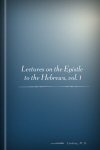
William Lindsay’s two-volume work provides a comprehensive review of all the major interpretive issues found in the book Hebrews. With 13 lectures, Lindsay draws on historical interpreters and the Greek text to explain the meaning of the epistle. Except where ambiguity in the epistle requires clarification, Lindsay does not use the Greek as a premise for technical linguistic analyses. Rather, he uses it as a jumping off point for understanding how the author of Hebrews informs theological propositions. Conversational in tone, this commentary augments high-level study of Hebrews, and is intended for readers with at least one year of Greek. Volume one contains eight lectures.
William Lindsay (1808–1883) was educated at the University of St. Andrews and was pastor at North-College Church from AD 1835 until 1854. At that time he became professor of theology in the Scottish Theological Hall, and then examiner in philosophy in 1861. A prolific author he published many books, including Christ and Christianity and Christian Thought and Work.
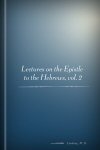
William Lindsay’s two-volume work provides a comprehensive review of all the major interpretive issues found in Hebrews. With 13 lectures, Lindsay draws on historical interpreters and the Greek text to explain the meaning of the epistle. Except where ambiguity in the epistle requires clarification, Lindsay does not use the Greek as a premise for technical linguistic analyses. Rather, he uses it as a jumping-off point for understanding how the author of Hebrews informs theological propositions. Conversational in tone, this commentary augments high-level study of Hebrews, and is intended for readers with at least one year of Greek. Volume two contains five lectures.
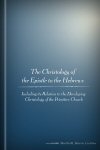
Considering the Epistle to the Hebrews as its main study, MacNeill’s work also examines the relationship between the Christological teaching in Hebrews and other early Christian writings. He shows how the biblical documents provided the framework for the Christology of early Christian writings, and his work is an early example of biblical scholarship utilizing historical inquiry with the utmost seriousness. MacNeill examines the way the Christological concepts in Hebrew were appropriated by early Christians, and the significance of the various titles ascribed to Christ in Hebrews and also of the book’s equivalence of Christ with Old Testament offices.
Harris Lachlan MacNeill was educated at the University of Chicago, and was a ground breaking New Testament scholar.
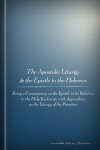
The Epistle to the Hebrews knots the ministry of Christ to the Old Testament more tightly than any other New Testament book. The Epistle of Priesthood unpacks what is arguably the most important aspect of that relationship in detail. Examining the text on technical grounds, Alexander Nairne shows how the lexical choices of Hebrews’ author and the theological groundings he employs—such as the doctrine of the incarnation—establish Christ as God’s high priest, the necessity of Christ’s priesthood, and how Christ’s occupation of that office fulfills the Old Testament’s prophetic witness.
Alexander Nairne (1863–1936) was professor of Hebrew at King’s College, London. A distinguished scholar, he contributed article to the Encyclopedia Britannica (11th ed.), and co-authored The Bible Doctrine of Atonement with H. C. Beeching.

The Apostolic Liturgy and the Epistle to the Hebrews: Being a Commentary on the Epistle in its Relation to the Holy Eucharist, with Appendices on the Liturgy of the Primitive Church
- Author: John Edward Field
- Publisher: Rivingtons
- Publication Date: 1882
- Pages: 723
Arguing that Hebrews provides an ongoing allusion to the Eucharist throughout the entirety of its text, John Field’s The Apostolic Liturgy and the Epistle to the Hebrews proposes that the dense Christology of Hebrews intends to deepen how we understand the Eucharist and what it means in the life of the church. He shows how Hebrews strategically utilizes Old Testament titles to refer to Christ, and then shows how the book uses them to create intentional overtures to Jesus’ work on the cross. He then draws his argument to the Eucharist by showing how Hebrews’ author cleverly utilizes ostensibly mundane phrases, such as “we have come to share in Christ” to connect theological titles to Christian practice.
John Edward Field (1841–1922) was vicar of Benson, and New Testament scholar.
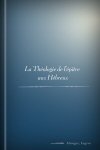
Ménégoz’ work examines the theology of the book of Hebrews. An early attempt at what modern scholars call “biblical theology,” this book illuminates the major theological concepts as they are understood from the perspective of critical literary theory. The work also explores the significance of the book’s multi-faceted and layered use of Old Testament symbolism. This book is written in French
Eugène Ménégoz (1838–1921) was French Lutheran minister and professor at the University of Paris at the Sorbonne. He was a distinguished theologian, originated the “Symbolo—Fideism” movement, and published multiple influential books including L'autorité de Dieu, réflexions sur l’autorité en matière de foi, La notion biblique du miracle, and Étude sur le dogmas de la Trinité.
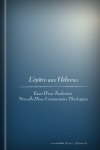
This book is a unique translation of Scripture in an attempt to substantiate the author’s theological perspective by a critical analysis of the text. Arguing from a Protestant perspective, Édouard Reuss interprets Hebrews critically, but with the intent of explaining within the paradigm of Lutheran theology. This volume is written in French.
Édouard Reuss (1804–1891) studied at Göttingen and at Halle. In Halle, he studied under the famous Hebrew scholar Wilhelm Gesenius. He taught biblical languages at Strasbourg Theological School, and was a member of the Lutheran Protestant Church of Augsburg Confession of Alsace and Lorraine.
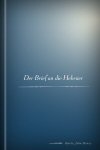
Examining Hebrews from the perspective of German literary criticism, a perspective predominant in the German academy in the nineteenth century, Kurtz’ commentary engages the text with a decidedly historical emphasis. As a late epistle, Hebrews is a key text for understanding the relationships between the first–century church and the church in the apostolic era. This volume is written in German.
Johann Heinrich Kurtz (1809–1890), also known as John Henry Kurtz, was a Lutheran theologian, and was educated the University of Halle and Bonn. In 1835, he became a religious instructor at the school of Mitau and a professor of theology at the Protestant University of Dorpat. Several of his other works have been translated into English, including Church History and Manual of Sacred History.